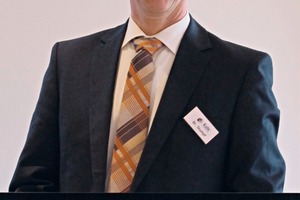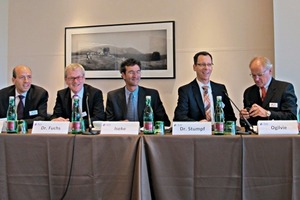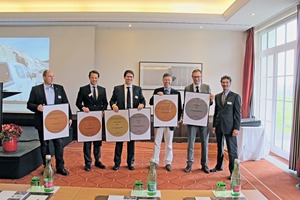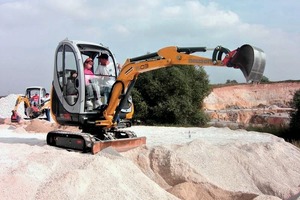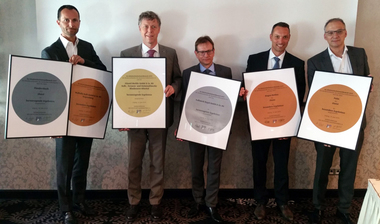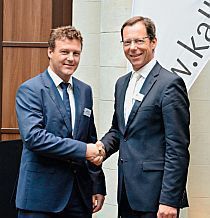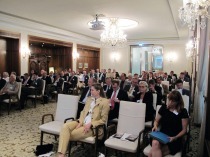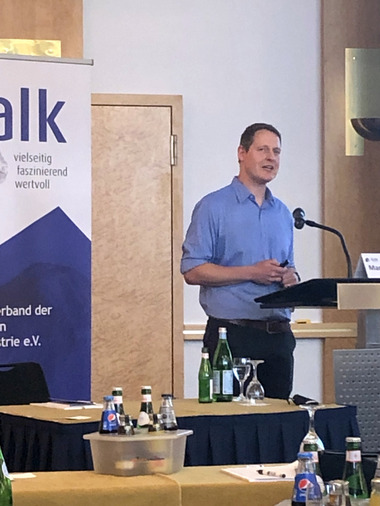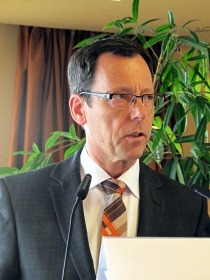Mixed economic situation in the lime industry – substantial risks for the future
The General Meeting as a gathering of the German, Austrian and Swiss Lime Industry (Bundesverband Kalk/BVK) was held this year in the Austrian town of Fuschl am See near Salzburg. The meeting was marked by the 10th anniversary of the event “Day of the Open Quarry”. BVK-Chairman Dr. Thomas Stumpf, a Member of the Board of Fels-Werke GmbH, Goslar/Germany, made it clear in his speech that the challenges facing the industry were increasing constantly and thus transparency, visibility and public information are more necessary than ever. It is not without reason that this year’s “Day of the Open Quarry” also has the motto “Lime – A Local Industry”.
Currently, the German lime industry is embedded in a general upswing of German industry, Stumpf said. The Federal Government has forecast a growth of 1.8 % in 2015 and 1.8 % in 2016. The chairman called on the federal government to re-orientate its economic policies and improve conditions for investment – particularly with regard to infrastructure, tax policy and effective implementation of the energy transition. According to the latest lime industry figures presented by Stumpf, the economic situation is generally mixed.
In 2014, sales of unfired products amounted to almost 19 million tonnes, which is a renewed increase of around 1.5 % over the previous year. The plants of the German lime industry, responsible for around 15 % of the unfired products in Germany, delivered 7.3 million tons to the construction trade in the past year and thus achieved an increase of 0.8 %. Products supplied for environmental applications again grew by 1.1 % over the previous year. This market segment with its consumption of 2.2 million tonnes is now significantly larger than the traditional application range of unfired products in the building materials industry. Deliveries of unfired products for industry increased by 2.1 %, but deliveries to the iron and steel industry suffered a decrease of 2.4 % over the previous year. It should, however, be noted that 2013 was an extremely positive year for this sales segment.
Following a rise of almost 4 % in sales of fired products to a level of 6.5 million tons in 2013, the German lime industry experienced a significant decline by 2 % to 6.39 million tonnes in 2014. However, sales of lime to industrial users did show a slight increase of 0.4 % in 2014.
The delivery volumes for environmental protection purposes declined by 1.2 %. For example, the amount of fired products supplied for the purpose of air pollution control was 1.4 % down. Quantities supplied to the construction industry also decreased. Apart from sales for the production of mortars and plasters, the entire building ma-terials sector declined.
On the other hand, sales volumes to the agriculture, forestry and aquaculture sectors showed a positive trend, even achieving an increase of 1.7 %.
For 2015, the German lime industry anticipates – in accordance with the overall positive economic development – that sales of fired products will increase by 2 % to 6.5 million tonnes. However, the chairman warned that uncertainties caused by the unclear future of coal-fired power stations were certainly present.
Next, Stumpf focussed on some of the manifold challenges which the lime industry faces. First, he said that the energy transition had dangerously faltered. The currently planned decommissioning of power plant capacity is significantly higher than the planned new capacity. Consistent implementation of the agreed energy transition and European integration into the energy policy are urgently needed.
The lime industry is intensively engaged in the organization of the emissions trading system in Europe after 2020, the BVK chairman stated. Here, a uniform positioning of German industry has been achieved. The chairman particularly emphasized the following demands because of their particular relevance to the lime sector:
Reduction commitments for the years after 2020 would have to be guided by feasible reduction targets. In particular, the lime industry with its high proportion of process emissions has already achieved the optimum result under the given process-technological conditions.
The most CO2-efficient plants must not be additionally burdened.
A cross-sector correction factor has been rejected because it does not respect the sector-specific emission reduction possibilities and physico-chemical limits.
Protection against “investment leakage” must be provided in order to prevent a further reduction of the capital stock in Germany.
Benchmarks should only be adjusted when there has been a genuine technical advance and they also correspond to economically feasible reduction potentials and the state of the art. A simplified procedure for benchmark updating should be used.
The Chief Executive of the German Association, Martin Ogilvie presented the Annual Report 2014/2015 to the General Assembly and explained the current core areas of association activity: the Renewable Energy Law and special compensation scheme, emissions trading, industrial emissions directive (IED), energy and electricity tax, EIA Directive, standardization, etc.
Especially important to Ogilvie was the knowledge network “CementLimeConcrete”. This represents the lime industry’s entry into Web 2.0. By means of this platform, the association provides the industry with an unprecedented knowledge base on the subject of lime. In addition, starting this autumn more than 80 hours of education courses about the entire production chain of the industry will be available on the platform for employees of the lime industry.
He stressed that the lime industry is intensively engaged in the development of young employees. 17 films can meanwhile be accessed via YouTube under the title “career with lime”, in which industry professionals and students explain a number of occupations in the industry, possible training paths and relevant academic study courses.
Dr. Daniele Ganser, University of Basel/Switzerland gave the celebratory address on the topic “Terror and the global fight for oil: Why do we need the energy transition”.
The next general meeting of the BVK will take place on 16./17.06.2016 in Bremen/Germany.

